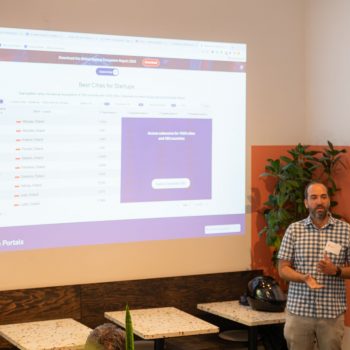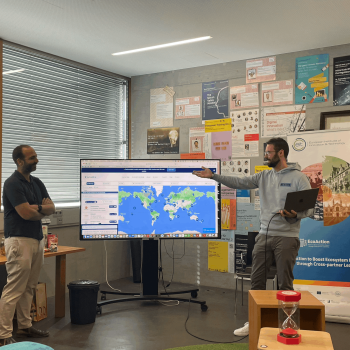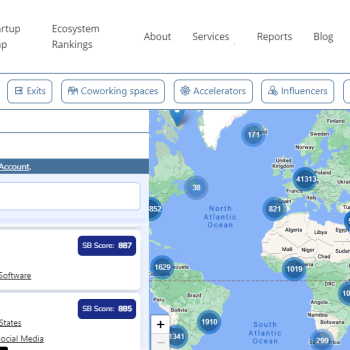In today’s interconnected world, governments are increasingly recognizing the significant value of attracting foreign talent. As a response to the rise of remote work and the growing influence of startups, special visas tailored for startup founders and digital nomads are gaining momentum. The two main examples are digital nomad visas and startup visas. These visas not only cater to the needs of remote workers but also aim to foster integration with local economies and startup ecosystems. While the success of these programs is still uncertain, the signal of welcoming foreign talent is momentous. According to Think Remote, the number of digital nomads surged from 10.9 million in 2021 to over 35 million by the end of 2022, highlighting the increasing demand for flexible work arrangements.
Benefit from Exclusive StartupBlink Discount on Deel's Services
Whether you want to hire contractors and employees worldwide without opening legal entities, streamline HR for your global team, or consolidate payroll for everyone — Deel does it all (while keeping you compliant). With StartupBlink, you can benefit all of Deel perks with a 10% discount.
The Emerging Trend of Attracting Foreign Talent
Governments worldwide are recognizing the pivotal role foreign talent plays in driving economic growth and innovation. This acknowledgment has led to the implementation of special visas like the highly acclaimed Tech Nation Visa in the United Kingdom, which has experienced a significant influx of applications, indicating its potential impact. When comparing startup visas to digital nomad visas, StartupBlink places greater value on startup visas due to their long-term potential for economic growth, job creation, and investment. In contrast, digital nomad visas often prioritize short-term stays and tourism revenue.
However, the top 20 cities in the StartupBlink Global Startup Ecosystem Index 2023 are primarily focused on established industries, corporate headquarters, and infrastructure tailored for startups. These cities prioritize stability and scalability, which may not align with the needs and preferences of digital nomads. Digital nomad hubs tend to emerge in cities that offer a more relaxed lifestyle, lower cost of living, and a strong sense of community among remote workers. The high cost of living prevalent in the top 20 cities can be a barrier for digital nomads who seek affordability and flexibility. These cities excel in the startup realm, attracting entrepreneurs and investors, but they may not provide the ideal conditions for digital nomads seeking a location-independent lifestyle.
While the top 20 cities in the Global Startup Ecosystem Index may not currently align with the preferences and needs of digital nomads, there is potential for adaptation. These cities, renowned for their thriving startup scenes, have the opportunity to adapt their visa policies to attract foreign talent, as exemplified by the success of the Tech Nation Visa in the United Kingdom.
Integration with the Local Economy and Startup Ecosystem
The longer stays facilitated by these visas allow foreign talent to immerse themselves in the local economy and startup ecosystem, leading to mutually beneficial outcomes. Their expertise, skills, and innovative ideas contribute to fostering economic growth, while their interactions with local businesses and entrepreneurs encourage collaboration and knowledge exchange. Through building connections and partnerships, foreign talent becomes an integral part of the local startup ecosystem, driving innovation and productivity.
Uncertainty Surrounding the Success of Special Visa Programs
While special visas for startup founders and digital nomads offer exciting opportunities, there are challenges that hinder their widespread adoption. Many individuals still prefer the convenience of tourist visas due to administrative complexities and a lack of familiarity with the visa application process. To ensure the long-term success of these programs, it is essential to evaluate their effectiveness and address these challenges proactively. Promisingly, several cities, such as Medellin and Barcelona, have emerged as digital nomad hubs, experiencing positive trends and increased attention as desirable locations for digital nomads and startups. These cities serve as models for successful integration efforts, where foreign entrepreneurs are seamlessly connected with the local startup ecosystem, maximizing their impact on the talent pool and overall economy.
Case Studies: Startup Chile and Tech Nation Visa
One prominent case study showcasing effective integration efforts is Startup Chile. This initiative focuses on connecting foreign entrepreneurs with the local startup ecosystem. The program’s pilot scheme offered successful applicants a comprehensive support package, including US$40,000 in seed capital, a work visa, and office space. This initiative sought to provide foreign entrepreneurs with the resources they needed to launch and grow their companies.
Recognizing that the mere presence of digital nomads or startup entrepreneurs is insufficient, Startup Chile emphasizes the importance of facilitating their integration to avoid isolated pockets with minimal impact. By offering office space, the program created an environment where entrepreneurs could collaborate, share ideas, and access a supportive network. This shared working environment fostered knowledge exchange, boosted creativity, and encouraged fruitful collaborations among startups.

Another compelling example is the Tech Nation Visa in the United Kingdom. This visa program, known as the Global Talent Visa, enables the best tech talent worldwide to contribute their cutting-edge expertise and creativity to the UK’s digital technology sector. What sets this visa apart from many others is its attachment to the individual, providing flexibility to change roles and move within the tech sector without requiring a specific job offer. With over 2,500 Global Talent Visa holders working in more than 900 UK tech businesses, it exemplifies the value and potential of well-designed startup visa programs.
Dean Kuchel on Visas for Digital Nomads
Dean Kuchel is a 9 years digital nomad, who traveled to 100+ countries. He is an ambassador to the digital nomad lifestyle, a public speaker, founder of Digital Nomads Israel and United Nomads, a consultant for various businesses and governmental bodies to promote remote work, the digital nomad lifestyle and the future of work. Find out his opinions on Digital Nomad Visas.

“ Visas for digital nomads and remote professionals are a big step in the right direction, enabling a higher degree of freedom to many people around the world regardless of their skills.
With more than 45 countries offering visas for Digital Nomads – benefits are mutual, Digital nomads can stay longer in a country, and many developing countries see remote professionals earning 2-3x the local average salary moving into the country, stimulating the local economy.
From the startup ecosystem point of view DN visas don’t carry much news, visas’ policies are mostly shaped in a way to promote long-term tourism rather than promote entrepreneurship and skill share as most DN visas don’t allow for any local business or work to be done. There is still a level of suspicion between all parties, and not enough data to better shape those policies.
In my work I encourage policy makers to create a framework to allow those who can prove online income from abroad to conduct limited business with local business, hire locally, and participate in professional events.
Make regulations clear and accessible in a way to promote collaboration with local ecosystems and remote professionals.
To summarize:
Countries calling for digital nomads to spend months and years within their borders enjoy the monetary impact of nomads bringing money from abroad. In places like Las Palmas, Bansko, and Chiang Mai – seasonal-tourism based businesses now operate year long as a result of remote professional staying during low season.
These countries should not miss on the opportunity to connect between the local startup ecosystems and the remote professionals community, many of them are entrepreneurs. We should create the space for conversation, and foster collaboration, not competition.
Digital Nomads Visa can become the platform to build now.”
Dean Kuchel
Conclusion
In conclusion, governments worldwide are realizing the importance of attracting foreign talent through specialized visa programs tailored for startup founders and digital nomads. While both startup visas and digital nomad visas have their merits, it is evident that startup visas have a more direct impact on the growth of the economy, fostering long-term economic growth, job creation, and investment. On the other hand, the impact of digital nomad visas remains uncertain, with their focus often centered around short-term stays and tourism revenue.
It is crucial for governments to recognize that there is no one-size-fits-all approach when it comes to attracting foreign talent. Each country and city has its unique characteristics and strengths that can be leveraged to create a substantial impact on their respective startup ecosystems. However, to maximize the potential benefits, governments should think about the long-term impacts of their visa programs and focus on integration with the local economy.
About Us:
StartupBlink is the world’s most comprehensive startup ecosystem map and research center, working with over 100 government entities worldwide. StartupBlink’s global startup ecosystem map has tens of thousands of registered startups, coworking spaces, and accelerators, creating a robust sample of innovation globally.
Our Partners:












